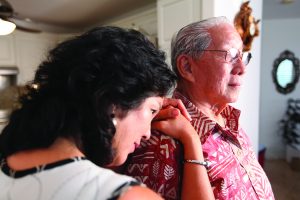As home healthcare providers, we’re often asked if a senior can live alone at home. While each situation is different, seniors who are alone can have additional risks that affect their health and well-being.
In 2016, the Administration on Aging reported 29 percent, or 13.3 million older adults age 65 and over, lived alone at home. Many seniors living alone experienced loneliness, social isolation and declining health, requiring more care from other persons. Despite these outcomes, nearly 90 percent of older adults still preferred to maintain their independence for as long as possible.
 At some point in time, caregivers for seniors may have to decide if leaving their loved ones alone is an option — even for short periods. This decision can be heartbreaking and difficult for both caregivers and seniors alike. Seniors should be involved in this decision-making process and include family members, friends and other care-providing professionals.
At some point in time, caregivers for seniors may have to decide if leaving their loved ones alone is an option — even for short periods. This decision can be heartbreaking and difficult for both caregivers and seniors alike. Seniors should be involved in this decision-making process and include family members, friends and other care-providing professionals.
“Individuals who are fiercely independent and have declining health may need more time to accept care,” said Carol Samples, RN and CEO for Attention Plus Care. “It’s never an easy decision. Having a support system in addition to a team of caregivers can be a great help.”
A caregiver always should consider the safety risks of seniors when deciding if they can be alone or not. For those with health or sensory problems, new or developing symptoms may go undetected without proper assessment.
Caregivers should seek alternatives to solo living if seniors have medical conditions and receive care for cognitive impairment or memory loss; physical mobility; poor vision, hearing, eating, drinking and swallowing; personal hygiene or orientating to their environment.
Additional warning signs for seniors that being alone may not be safe include:
◆ Not recognizing common hazards
◆ Wandering or getting lost at home
◆ Ignoring sounds signaling danger
◆ Not recognizing family from strangers
◆ Needing assistance to prevent falls
◆ Inability to get help in an emergency
◆ Medical conditions needing monitoring
◆ Not complying with prescribed treatment
◆ Not caring for wounds or infections
◆ Negative changes in mood or routines
Much can be done for seniors alone at home. Studies show that while isolated seniors had a 59 percent greater risk of mental and physical decline, those having more meaningful relationships with others were less likely to experience declines. In other words, it’s not the quantity but the quality of relationships that counts.
“Experienced home healthcare providers know this and caregivers can really make a difference for our seniors in this way,” Samples said. “It’s finding that connection.”
ATTENTION PLUS CARE HOME HEALTHCARE
Accredited by The Joint Commission
1580 Makaloa St., Ste. 1060, Honolulu HI 96814
808-739-2811 | www.attentionplus.com
AGING IN HAWAII EDUCATIONAL OUTREACH PROGRAM by Attention Plus Care — a program providing resources for seniors and their families, covering different aging topics each month. For class information and upcoming topics, call 808-440-9356.


Leave a Reply